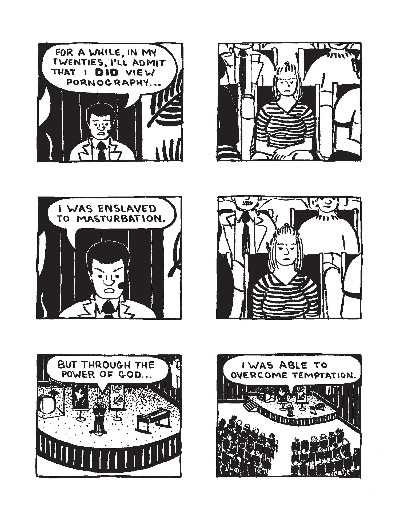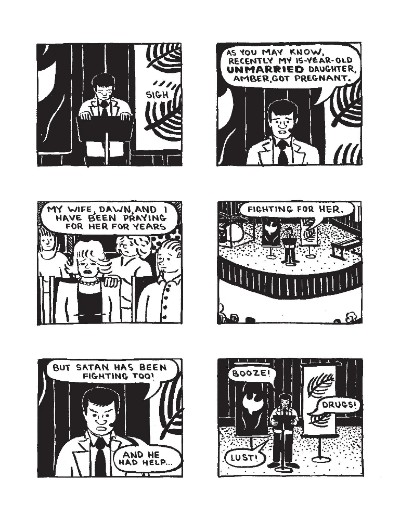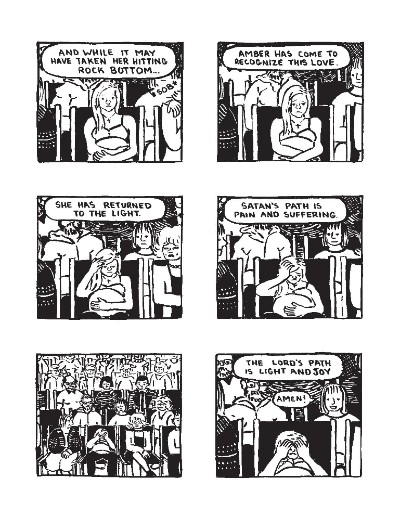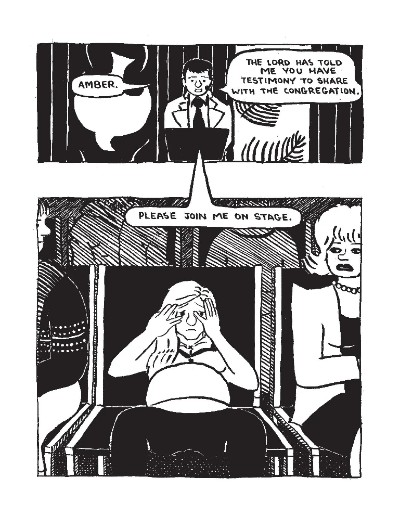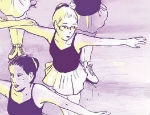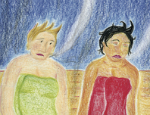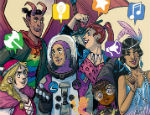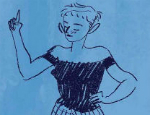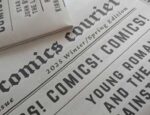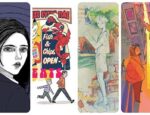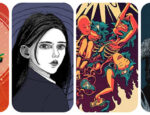School libraries in America banned more books in 2021 than ever before. Adding to this disturbing fact is the possibility that the LGBTQ+ community in that country is under attack. It is this backdrop that makes Jessica Campbell’s coming-of-age story Rave so powerful and poignant.
As a Canadian cartoonist who has made the state of Wisconsin her home, she presents her tale of sexuality and the weight of religion without judgement. The protagonist of Rave is a teenager named Lauren, trying to make sense of a world where people who proclaim the love of God also do everything in their power to withhold that love from those who need it most.
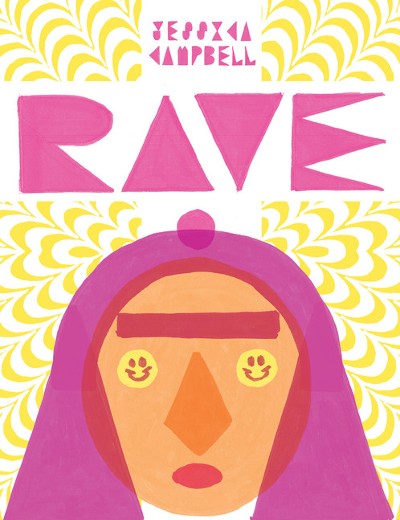
We reached out to Campbell with questions about the church, her secondary career as a teacher of art history, and how hopeful she is of change. Here are her responses:
BROKEN FRONTIER: Your book opens with a reference to the Equal Rights Amendment and a particularly worrying comment on feminism. What were you thinking about when you decided to begin working on Rave?
JESSICA CAMPBELL: I grew up in an evangelical church that was partly formed by a pastor named Harald Bredesen, who was Pat Robertson (the quote’s originator)’s mentor. I think that quote sums up some of the attitudes of the church that I grew up in, which include inflammatory syllogisms that Robertson is well-known for. I wanted to make a book that captured the feeling of growing up in an environment like this, particularly as a girl/woman. It’s something that has deeply impacted my worldview and life generally, and I’ve wanted to make work that addresses this culture for a long time.
BF: The early pages focus specifically on guilt and, although the period your story is set in is now long behind us, it doesn’t feel as if that guilt has really gone away. How do you look at religion today, given the church’s stand on LGBTQ issues?
CAMPBELL: Well, I now live in the United States, where the Christian Right is currently introducing legislation across the country that limit the rights of queer people and women. There is a politician who lives across town from me in Green Bay, Wisconsin who is trying to criminalize providing health care to trans youth. Abortion access is being limited or completely blocked across the country. The religious groups doing this claim moral superiority but target the most vulnerable members of our society.
Banning abortion, for instance, just makes me so furious. Bans on abortion don’t actually end abortions; they just make them illegal and unsafe. If these people really cared about the unborn or children or whatever, they would be trying to introduce publicly funded daycare or increased access to education or ending rape culture or the elimination of food deserts or any of the myriad ways in which they could improve the lives of kids and young parents. But instead, they want to make it so that women who need abortions will be charged with a crime or end up dead. I am constantly in a state of outrage about it.
Meanwhile, I do not believe that it is all religious people or even Christians who perpetuate these attitudes and cruelty, of course. I have religious friends and family members who I know are loving and empathetic people, which I believe are values that are engrained in all religions. I honestly think that most people are fundamentally good, and I really love living in a diverse world where I can benefit from a range of cultures, belief systems, perspectives, etc. I just want people to follow the golden rule and be kind to one another, and for all of us to work together to make this planet more hospitable, loving and safe for one another.
BF: You mentioned, in a recent interview, that you didn’t want your father to read the book because you were worried about his reaction. What sort of feedback have you been getting from people in your family who have read it so far?
CAMPBELL: I haven’t heard much from anyone thus far (the book just came out). My sister said it was depressing but accurate in the vibe it captures. Some members of my extended family apologized to me for not realizing the kind of environment we grew up in. My father hasn’t read it as far as I know, and I’m not sure that I want him to. Our relationship has already become really strained over the past few years (Trump, Covid misinformation, etc.), and I love him and don’t want to alienate him further. I know that he believes in god/the church above all else, and I doubt he would pick me if he felt forced to choose between me or religion. Actually, I know for sure he wouldn’t. I don’t want him to feel like he has to choose, but I also want him to understand what it feels like to listen to this kind of rhetoric when you aren’t someone who isn’t a part of the church’s hegemony (cis straight white man).
BF: As a cartoonist who also happens to be a teacher of art history, how satisfied are you with the way art is taught today? What would you like to change about it?
CAMPBELL: Oh, that’s an interesting question! I’m not sure that I’m equipped to answer it. I teach primarily because I need to pay rent. I also genuinely believe in the value of art and genuinely enjoy interacting with young artists, but I’m not sure that I’m an expert. I think my goal as an educator is to help give students the tools they need to express themselves as clearly as possible and to try to make a career in the arts if they’d like. I want them to think critically about what they encounter in the world. I want them to know there is a place for them at the table.
In terms of what other educators/schools are doing, I’m not sure that I can respond to specific pedagogies. I think, in general, that schools in the USA are prohibitively expensive to attend, which perpetuates class and race divides in who is allowed to become a practicing artist. I also think that they rely overly on underpaid adjunct labour. The system is rotten and needs to be adjusted to become more equitable.
BF: Are there any parallels between the work you do in comics and your art in other media? Comparing Rave to your most recent installation, Gigantomachinations, would it be safe to assume your choice of medium defines the style?
CAMPBELL: I always kind of say that there is no connection between the work, that they function in different ways (comics are narrative and more direct, studio work is more about materials/associations/interpretation). However, recently a friend (the cartoonist Laura Park), pointed out that there is a relationship between my “studio art” and comics in the way that I use patterning and design. I use a lot of pattern and very graphic black and white shapes in my comics, which I agree is related to the studio work. Gigantomachinations also dealt with some of my “daddy issues”/rage about the current state of politics and the environment, so there are conceptual threads that connect all the work, too.
BF: What are you reading these days, and are there any interesting new comics creators you have come across?
CAMPBELL: I’ve been reading a biography of the anarchist and writer of the first version of the Equal Rights Amendment, Crystal Eastman, whose brother Max edited The Masses. I’ve just gotten a copy of Matthew Thurber’s Mr. Colostomy, which I’m excited to read (I love him!). I also recently picked up a copy of Rebecca Rosen’s Flem, which is so beautiful. I am blessed to have lived in Chicago for a number of years, which introduced me to a lot of amazing young cartoonists like Gabe Howell, Caroline Cash, Mike Centeno… Honestly there are so many amazing new comics coming out that I have an impossible time keeping up. It’s great!
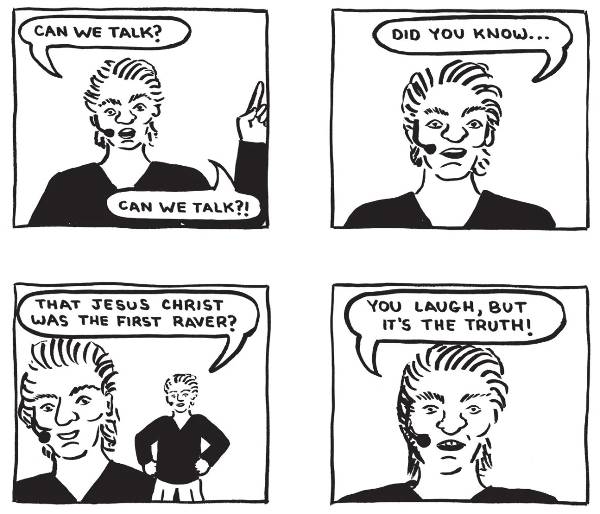
BF: Rave is being published at a particularly difficult time for some marginalised communities, given the rise of conservative groups across North America. How hopeful are you of change in the coming years?
CAMPBELL: Phew, I feel like this might be a bummer to end on because I don’t feel that hopeful about the future. I honestly think that climate collapse is the biggest issue for humanity at the moment and I don’t feel very hopeful about that, either. I think one thing that DOES make me feel hopeful is teaching. My students are so much smarter and more caring and sensitive than people my own age or older, which gives me hope for the future.
I’ve also noticed that a lot of people I know in recent years have been focusing on mutual aid, doing things like setting up community fridges and raising funds for each other’s medical expenses. The group “Make Yourself Useful” in Chicago comes to mind. Even though the fact that these kinds of organizations are needed is depressing, I think the care that these groups are showing for their communities is incredibly inspirational and does give me hope for the future. We have to take care of each other!
Also available from London’s Gosh! Comics here
Interview by Lindsay Pereira





